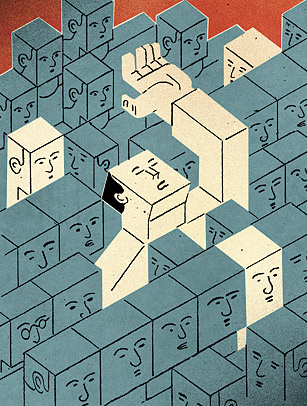
(2 of 2)
But California's ethno-political détente may not be in the cards for other regions of the country. Though whites will become a minority in the national population, the vast majority of individual states will probably remain majority white. (This is because the most profound demographic change is happening in a handful of the most heavily populated states.) A strong white-minority political consciousness is most likely to arise in regions that are nowhere near actually becoming majority-minority. It is in these regions, where white-minority status is more phantom than reality, that politicians and demagogues can best employ the rhetoric of white ethno-nationalism.
This won't take the form of a chest-thumping brand of white supremacy. Instead, we are likely to see the rise of a more defensive, aggrieved sense of white victimhood that strains the social contract and undermines collectively shared notions of the common good.
Way back in 1991, Arthur M. Schlesinger Jr. wrote the best-selling book The Disuniting of America, in which he argued that identity-based multiculturalism threatened the integrity of the nation. "The cult of ethnicity," he wrote, culminated in an "attack" on a shared American identity. He decried the "separatist impulses" of nonwhites, "or at least their self-appointed spokesmen." Nearly two decades later, one can hear evidence of white grievance in many corners of the country. And it's not coming just from fringe bloggers. In the spring of 2008, candidate Hillary Clinton appealed to "hardworking white Americans" to help her campaign against an ascendant Barack Obama. Last March, conservative commentator Glenn Beck suggested that the white man responsible for the worst workplace massacre in Alabama history was "pushed to the wall" because he felt "silenced" and "disenfranchised" by "political correctness."
The past decade has also seen a rise in the number of accusations of reverse discrimination and the emergence of high-profile court cases — like the one filed by firefighters in New Haven, Conn. — in which white men claim they were denied promotions because of their race.
Over the next decade, we're likely to see more antidiscrimination suits filed and growing anger over reverse discrimination. Not only will traditional affirmative action run into greater resistance, but there will be demands for whites to be included in affirmative action and even in government set-aside programs. In the face of growing demographic change, new groups will be dedicated to defending the interests and rights of European Americans. Candidates of both major parties will increasingly appeal to this sense of white grievance.
This means race will continue to be a defining feature of our politics, but the dynamic will be the precise opposite of what it was a generation ago, when angry nonwhite activists were a centrifugal force in America. Instead, with the election of Obama, blacks are polling as more optimistic than they were before. Having pretty much abandoned their counter-cultural stance, Latino activists are not fighting against U.S. power but are instead demanding that immigrants be allowed to become part of it. Meanwhile, even though they are still the majority and collectively maintain more access to wealth and political influence than other groups, whites are acting more and more like an aggrieved minority. Schlesinger would be turning in his grave.
Rodriguez is the author of Mongrels, Bastards, Orphans and Vagabonds: Mexican Immigration and the Future of Race in America